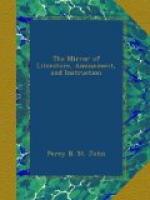One Borelli observes, that such accidents often happen to great drinkers of wine and brandy, and that it would be of much more frequent occurrence, were it not for the natural moisture of the body. Notwithstanding this, your readers must not think that I am opposed to the “cheerful draught:” I would say,
“Let each indulge his genius, each
be glad,
Jocund and free, and swell the feast with
mirth.
The sprightly bowl go cheerfully round.
Let none be grave, nor too severely wise;
Losses and disappointments, cares and
poverty,
The rich man’s insolence, and great
man’s scorn,
In wine be all forgotten.”—ROWE.
St. Pancras.
W.A.R.
* * * * *
RETROSPECTIVE GLEANINGS.
* * * * *
EARLY PARLIAMENTS.
When the Saxon government was first established in England, there was no distinction of freehold and copyhold; the latter, according to Blackstone, was a possession acquired by a vassal subsequent to the Norman feudal system. Copyholders being thus considered as slaves, were, notwithstanding their possessions, deemed unworthy of the franchise; and from this refinement, on the arbitrary principles of the Normans, every copyholder was deprived of a vote, unless he could claim it by some other tenure.
The term borough originally meant a company consisting of ten families, which were bound together as each other’s pledge. Afterwards boroughs came to signify a town, having a wall, or some sort of enclosure round; and all places that, in old times, had the name of boroughs, it is said, were fortified or fenced in some shape or other.
In the time of the West Saxons, a parliament was holden by King Ina, by these words: “I, Ina, King of the West Saxons, have caused all my fatherhood, aldermen, and wisest commons, with the goodly men of my kingdom, to consult of weighty matters.”
William the Conqueror, in the fourth year of his reign, called a parliament, which consisted of twelve representatives for each county, and the cities and boroughs were wholly omitted. After the battle of Lewes, in which Henry III. was defeated by the barons, they called a parliament, and made the king sign an order to summon four knights to represent each county, and four for the cities of London, York, and Lincoln. These representatives were chosen by universal suffrage of the householders, and although the king regained his authority by the subsequent defeat of the barons, two members for each county continued to be elected in the same manner till the 8th of Henry VI. In the parliament held in the 49th of Henry III., he sent writs to the nobles and to the sheriffs of several counties, to return two knights for each county, two citizens for each city, and two burgesses for each borough.
It was contrary to an ancient rule of the constitution, that any person should be allowed to vote at elections who did not reside in the place or county where the election was made; that rule says, that “ineddem comitata commercentes et residentes” only shall vote; and this was confirmed by an act of parliament, (1 Henry V. c. i.) but recently repealed.




